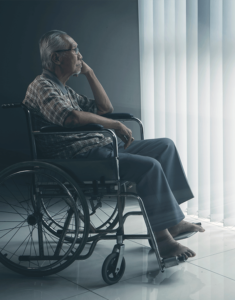Elder abuse in nursing homes is an ongoing problem in America, and often under-reported. At this time there are no official statistics to track incidents of nursing home abuse, but it is estimated that approximately 1 to 2 million Americans aged 65 and older have experienced abuse at the hands of their caretakers. This article will outline the most common forms of nursing home abuse, and the warning signs that you can spot so that you can protect your loved ones.
- Physical Abuse
This category covers intentional use of force against elderly individuals that results in physical pain, personal injury, or impairment. Examples of physical abuse include being hit or kicked, excessive restraint with straps or ties, getting pushed or shoved, choking, burning, or the overuse of drugs to “chemically restrain” an elderly patient.
It is common enough that a World Health Organization study from 2020 shows that over 9% of nursing home staff have admitted to physically abusing their patients. The prevalence of this type of abuse should be of major concern if you have a loved one in a nursing home.
This type of abuse will produce a number of outward physical signs, from bruises to scars to burns.
- Emotional or Psychological Abuse
This type of abuse includes both verbal and non-verbal actions that serve to cause emotional and psychological damage. Harmful language and negligent actions can cause a great deal of harm, and the actions that produce this damage include:
- Yelling and threats that are designed to intimidate
- Humiliation and ridicule
- Blaming or scapegoating
- Ignoring the patient
- Controlling the patient’s access to friends and activities
- Menacing the patient
- Name calling
- Isolating the patient from family
- Insulting the patient’s appearance or intelligence
Nursing home residents who experience this type of abuse will show signs of depression and PTSD, and if you suspect that emotional abuse is occurring be mindful of changes in mood and personality.
- Sexual abuse
This category includes any non-consensual sexual act against the elderly patient. Whether it involves forcible sexual acts, showing pornographic material, forcing them to watch sexual acts, or forcing them to undress, this type of abuse is pernicious. Similar to the previous category, be mindful of personality changes, since it will produce traumatic psychological damage.
- Neglect and Abandonment
Half of the reported cases of nursing home abuse are neglect and abandonment cases. These actions include:
- Failure to maintain the resident’s personal hygiene
- Failure to feed and hydrate the resident, resulting in weight loss and dehydration
- Failure to report injuries or illnesses to physicians
- Ignoring the patient’s complaints about care
- Leaving the resident unattended for long periods of time
- Improper dispensation of medications
- Leaving residents in unclean and unsanitary conditions
- Financial exploitation
This type of abuse involves stealing and defrauding the resident through manipulation. You can discover it by investigating your loved one’s personal finances for things like:
- Changes to their will through a change in power of attorney
- Prevention of personal access to funds
- Stolen cash, credit cards, and valuables
- Stolen financial records and other documents like bank statements
This exploitation of the resident’s assets and personal information can also open them up to identity theft and forcing them to lose out on essential funds for their long-term care.
- Healthcare Fraud and Abuse
In this category, you will find that it is being carried out by doctors, nurses, and other healthcare workers. The examples include:
- Charging for healthcare that is not being provided
- Overcharging or double billing for services
- Kickbacks for referrals or the prescription of drugs
- Over- and under-medicating
- Recommending questionable treatments for illnesses
- Medicaid and Medicare fraud
This type of abuse can be difficult to uncover and require a great deal of diligence on the part of the patients and their loved ones. If you or a loved one suspect that nursing home abuse or neglect is going on contact the police immediately and contact a nursing home abuse attorney to conduct further investigations and to pursue compensation options against the nursing home.
Attorney Steven A. Harris regularly blogs in the areas of family law, bankruptcy, and real estate closings on this website. He is always available in any of the firm’s offices or by phone anytime for a consultation. Mr. Harris tries to provide informative information to the public in easily digestible formats. Hopefully you enjoyed this article and feel free to supply any feedback. We appreciate our readers and love to hear from you!



